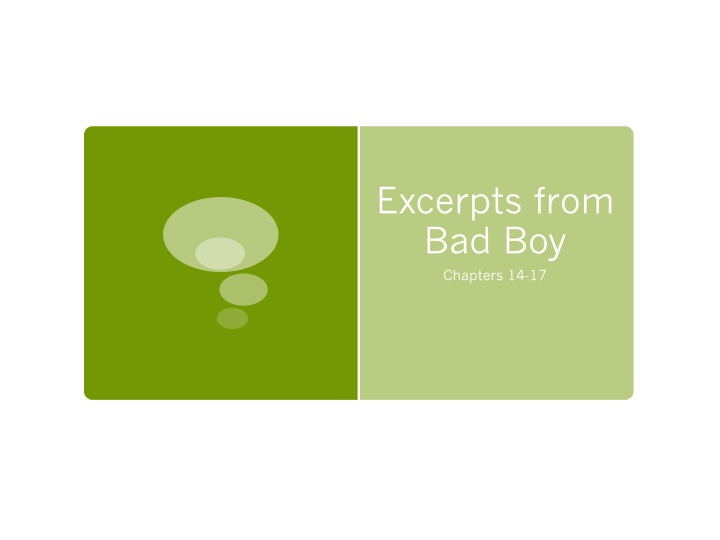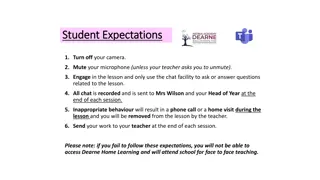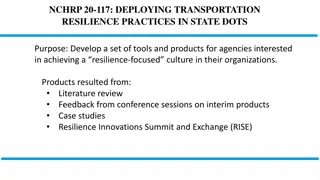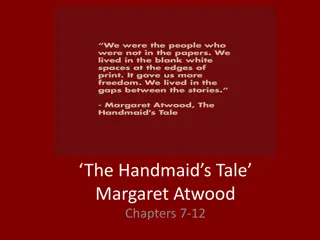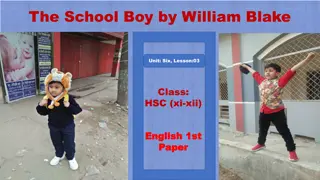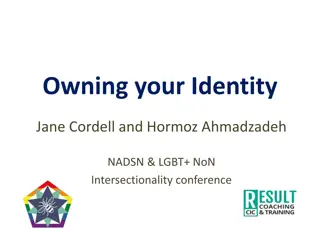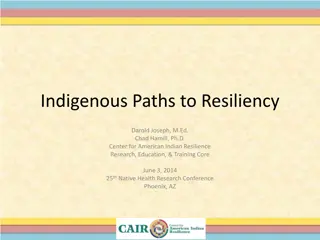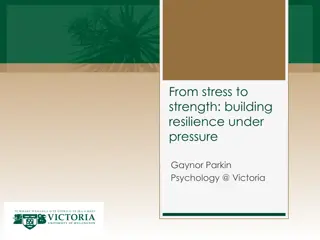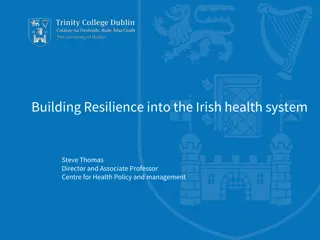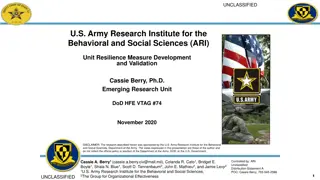Reflections on Identity and Resilience in "Bad Boy" Chapters 14-17
Walter, a troubled high school student, faces challenges as his truancy is discovered. Despite the criticism and pressure from authorities, his English teacher offers a lifeline by encouraging him not to stop writing. Walter grapples with feelings of shame and desperation, highlighting the struggles of maintaining his identity amidst societal expectations.
Download Presentation

Please find below an Image/Link to download the presentation.
The content on the website is provided AS IS for your information and personal use only. It may not be sold, licensed, or shared on other websites without obtaining consent from the author.If you encounter any issues during the download, it is possible that the publisher has removed the file from their server.
You are allowed to download the files provided on this website for personal or commercial use, subject to the condition that they are used lawfully. All files are the property of their respective owners.
The content on the website is provided AS IS for your information and personal use only. It may not be sold, licensed, or shared on other websites without obtaining consent from the author.
E N D
Presentation Transcript
Excerpts from Bad Boy Chapters 14-17
Journal What is your identity? Write for 5 minutes
Discussion/Introduction Walter, how are you? The guidance counselor I had spoken to earlier looked at me. Fine, I said, shrugging. All the notes I had sent in were produced. Mama was amazed at how well I had forged her signature. No, I hadn t been ill, not at all. No, she hadn t known I had missed nearly thirty days of school. Mama was taken into an inner office for a private conference, and I was made to sit outside. Several teachers came into the guidance office on business. My English teacher was one of them. She looked at me. Are you in trouble? she asked. I think so, I answered. Whatever happens, she whispered, don t stop writing.
Things to Consider (use evidence) What does Walter s English teacher tell him while he sits in the guidance office? Whatever happens, she whispered, don t stop writing. Based on your background knowledge, what impact did this statement have on Walter? Discuss with your group, 1 person may share
Vocab: you may use your phone or class dictionary Apparent (156) Insolence (156) Predicament (156) Flickered (156) Taunted (157) Bowels (169) Hyphen (177) Breadth(182) Ambition (182) Mediate (182) Charade (183)
Page 156, first full paragraph It was apparent that the man interviewing me took my reluctance to answer his questions as insolence. He asked me if I thought I was better than everybody else. I answered no, of course. What we never discussed was how desperately I wanted to hide my feelings from him, or how ashamed I was of my predicament. I listened as he told me how I should be living my life, what I should have been doing with my opportunities, and how ashamed I should have been for giving everyone so much trouble. I looked down at my shoes. Thoughts of suicide flickered through my mind.
Things to Consider (use evidence) The man interviewing Walter from the state agency makes a point of listing Walter s failures. Why do you think he does this? It was apparent that the man interviewing me took my reluctance to answer his questions as insolence Explain whether this is the best way to deal with a truant high school student. No, Thoughts of suicide flickered through my mind. Consider how you would want to be treated if you were Walter. Talk with your group, 1 person may share.
Page 157, second to last paragraph-Page 158 second paragraph Frank was beaten up a lot by neighborhood kids who taunted him because he was black. His mother couldn t or wouldn t do much about the bullying, and Frank responded by staying in the house as much as possible. Things went from bad to very much worse in one horrible incident. Frank and his mother were on a bus going from New York to Long Island. His mother had been drinking and was loud, and the bus driver decided to put them off the bus. Mrs. Hall refused to get off the bus, and the driver tried to push her off. Frank didn t remember anything that had happened after that. His next memory was of waking up in a hospital, secured to a bed. Later he learned that he had stabbed the bus driver and two other passengers to death. He was locked away in Creedmore, a New York City mental institution, from the time he was thirteen. When he was sixteen, his mother was able to get him out. She sold the house and moved into an apartment, and they lived together for a while. Then there was another incident. He and his mother were at a party. There was an argument, and he passed out. This time there was one dead victim.
Things to Consider (use evidence) Why did Frank spend much of his youth in mental institutions? Later he learned that he had stabbed the bus driver and two other passengers to death. Frank was beaten up a lot by neighborhood kids who taunted him because he was black. His mother couldn t or wouldn t do much about the bullying
Page 169, first full paragraph To get to Dr. Holiday s office, I had to walk down a long gray corridor that seemed buried deep in the bowels of the hospital. I knew that if I had not scored so highly on the I.Q. tests, I would have been considered just bad, or rebellious. But I was certifiably bright and, therefore, disturbed. There were benches along the walls outside the doors with their frosted glass and their neatly printed names and titles.
Things to Consider (use evidence) Why does Walter think he has been labeled disturbed rather than rebellious ? I knew that if I had not scored so highly on the I.Q. tests, I would have been considered just bad, or rebellious.
Page 177, last two paragraphs I wasn t born with a hyphen linking me to Africa, any more than I was born with a desire to dribble a basketball or to write. These were interests that I worked on developing. These were activities I chose. Being Afro-American, or black, was being imposed on me by people who had their own ideas of what those terms meant. In the Harlem home in which I was raised, the binding forces were love and survival, not race.
Things to Consider (use evidence) What does Walter consider to be the binding forces in his Harlem home? In the Harlem home in which I was raised, the binding forces were love and survival, not race. Why is this significant? Discuss with your group, 1 person may share.
Page 179, last full paragraph My answer to the question of race was to reject my identity as a black and take another identity. I could not identify myself as white, or as any other race. I could identify myself as an intellectual, and this is what I did, telling myself over and over again what white teachers so often told me, that race didn t matter if you were bright. When I came to the painful realization that my family could hardly afford to keep me in high school, and that college was out of the question, I knew also that I had lost even this adopted identity. Do you like being black? Dr. Holiday asked. Yes, I answered. Of course I do.
Things to Consider (use evidence) Walter continues to feel isolated, even when he attends school and attempts do do the assigned work. I knew also that I had lost even this adopted identity. Discuss this internal struggle and how you think he can overcome it. Discuss with your group, 1person shares
Page 182, first full paragraph What I wanted to do was create a world to replace the one that I felt had failed me. I had spent fifteen years of my life trying to expand my universe because I had been told that was what I should do, but there was no breadth to my world, no experience that would tell me what to do now that I was in trouble. Dr. Holiday said that she wanted to help me see my strengths, but I thought I did see them. My growing understanding of literature was a strength, even if my intense interest in it isolated me from people around me. My ambition to make things right, to mediate between God and man to bring fairness and justice to the world, was a strength, even if it isolated me from the guys I played ball with. I thought that my seriousness was a strength, even as it isolated me from the teenagers around me who were busily discovering the importance of their own sexuality and how much fun their lives could be. I knew my strengths well, and they were killing me.
Things to Consider (use evidence) What does Walter recognize as his three greatest strengths? My growing understanding of literature was a strength, even if my intense interest in it isolated me from people around me. My ambition to make things right, to mediate between God and man to bring fairness and justice to the world, was a strength, even if it isolated me from the guys I played ball with. I thought that my seriousness was a strength, even as it isolated me from the teenagers around me How might a person s greatest strengths also be his/her greatest weakness? Discuss with your group, 1 person may share.
Page 183, halfway through first paragraph to the end I imagined people asking whatever had happened to me. Did he simply fall by the wayside? Was all his brightness really just a charade, a pose he had affected before the spotlight fell upon him and revealed how much of a nothing he really was? Or did he simply become a Negro, sweating and straining through the streets of the garment center with all the other Negroes? Did he simply sit in the park, a book propped on his lap, pretending to read as the real world passed him by? Surely, if the answer to the question was that I had died in some glorious adventure, I would have, at least, not failed. At Dr. Holiday s office she asked me what I had been thinking about during the week. I told her that I thought that dying in battle was not a bad thing. She called Mama and asked if I had ever tried to kill myself.
Things to Consider (use evidence) Why does Walter think dying in battle might not be a bad thing? Surely, if the answer to the question was that I had died in some glorious adventure, I would have, at least, not failed.
Page 189, last paragraph It was years before I discovered the shame that hid him from me. My father couldn t read. He had no idea how to reach the person I had become and was too embarrassed to let me know. When, a lifetime later, he lay, a fragile remainder of the powerful man he had been, in the veterans hospital in East Orange, New Jersey, I brought him the only gift that had meaning to me, a book I had written. He looked at it and put it down on the white hospital table next to the bed and smiled. I wanted to beg him to pick it up and look at my words, to tell him that it was all I had and all I was. I think he knew, but there was nothing he could do about it. The printed words were a code that forever separated us.
Things to Consider (use evidence) What does Walter give his father in the veteran s hospital? I brought him the only gift that had meaning to me, a book I had written. What was his father s attitude for receiving this gift and how did Walter interpret his father s attitude? He looked at it and put it down on the white hospital table next to the bed and smiled. I wanted to beg him to pick it up and look at my words, to tell him that it was all I had and all I was. I think he knew, but there was nothing he could do about it. Explain the metaphor, The printed words were forever a code that separated us. P .190 top of page Discuss with your group, 1 person may share.
Page 203, first full paragraph A turning point in my writing was the discovery of a short story by James Baldwin, Sonny s Blues. It was a beautifully written story, but, more important, it was a story about the black urban experience. Baldwin, in writing and publishing that story, gave me permission to write about my own experiences. I was playing a lot of ball at the time, and my next story, about basketball, was accepted the first time I sent it out. When my half-brother Wayne was killed in Vietnam, I was able to handle the grief of his loss by writing about it for Essence magazine. I found other black writers, in particular the journalist Chuck Stone, and I met John O. Killens, who in turn introduced me to James Baldwin. I tried to explain to Baldwin, who had grown up just blocks from me in Harlem, all that Sonny s Blues had meant to me, but I couldn t.
Things to Consider (use evidence) What story about the black urban experience deeply impacts Myers? How does it impact him? A turning point in my writing was the discovery of a short story by James Baldwin, Sonny s Blues. It was a beautifully written story, but, more important, it was a story about the black urban experience. Baldwin, in writing and publishing that story, gave me permission to write about my own experiences.
